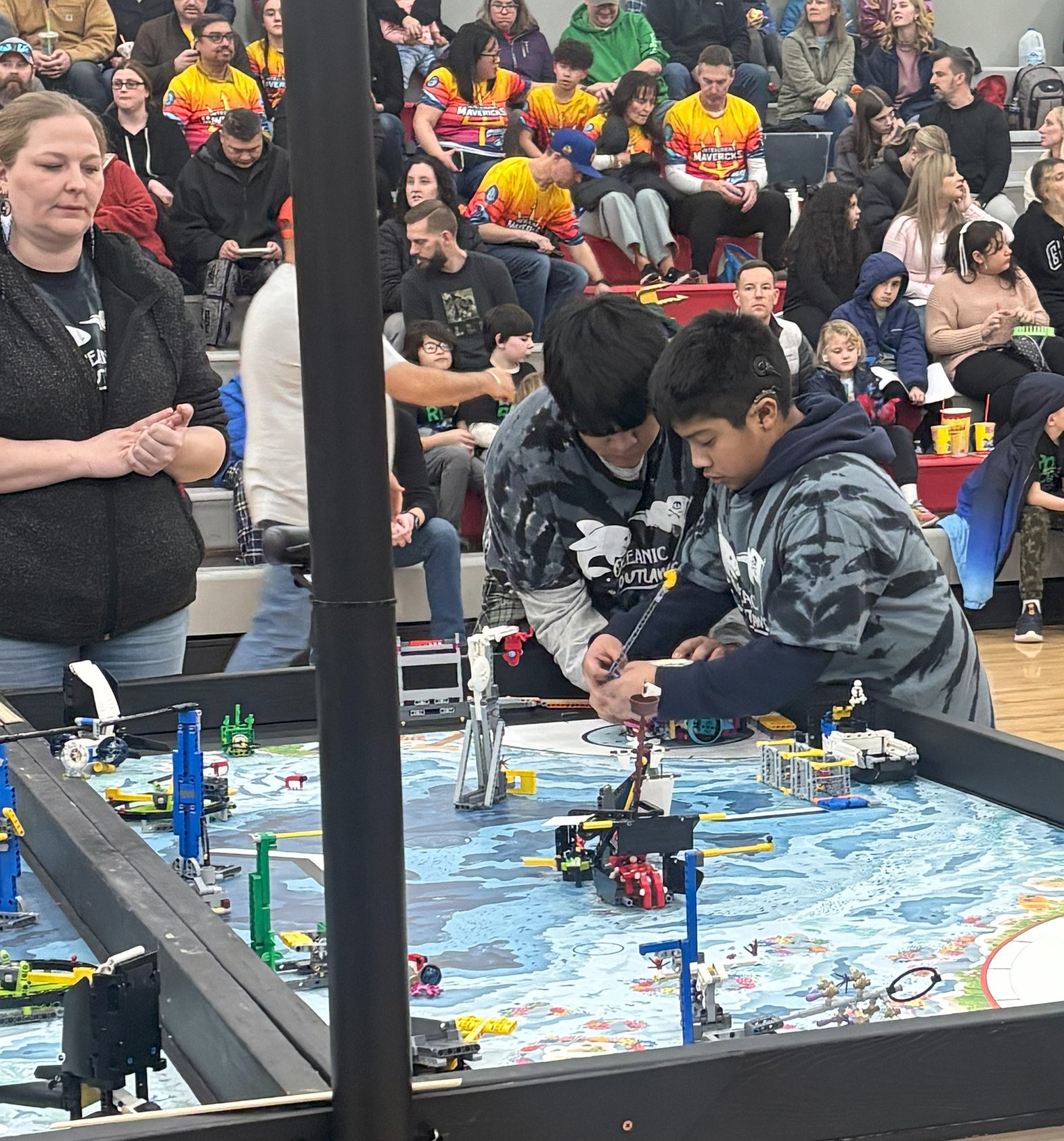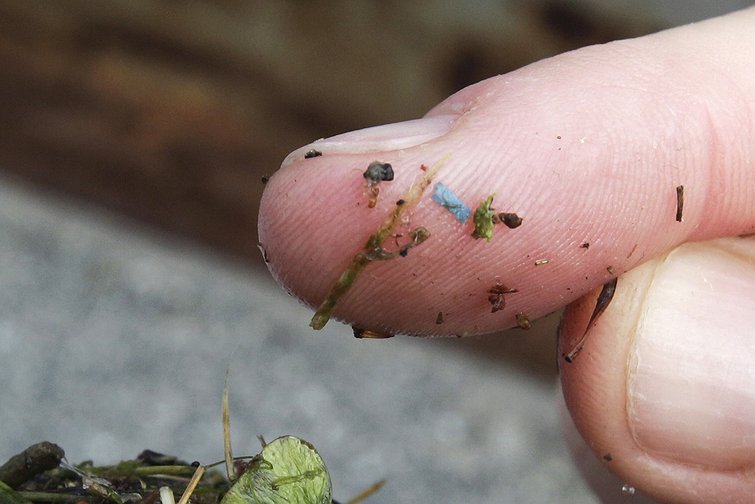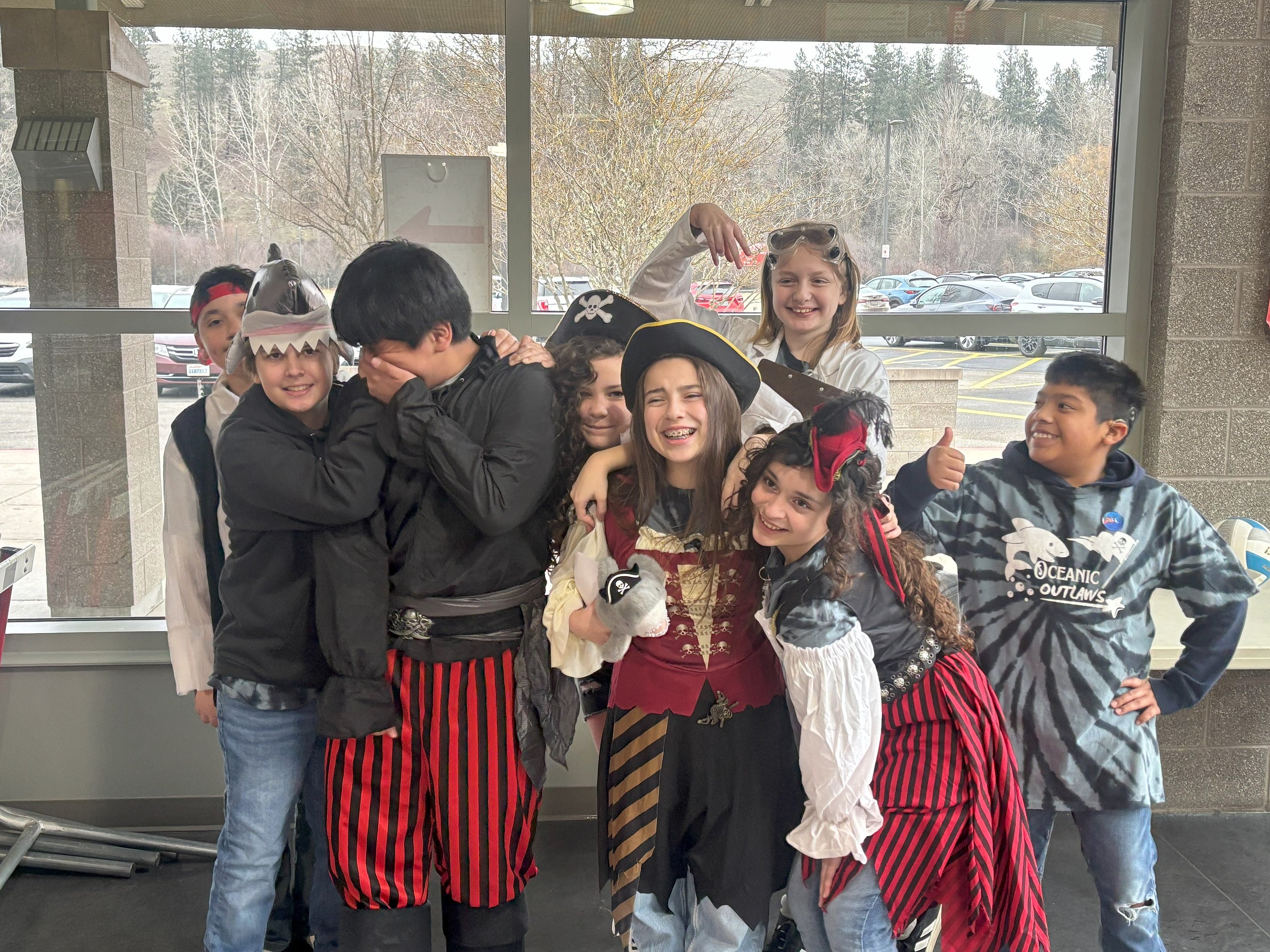Under the sea
ROYAL CITY — The Royal Middle School Oceanic Outlaws robotics team is headed to Nationals.
The eight seventh- and eighth-grade students took home the Champion Finalist award at the FIRST LEGO League state competition in Spokane on Jan. 18, according to their coach, RMS science teacher Theresa Piper.
“We started robotics back in September, and they've been working really hard on investigating a problem and then developing an innovative solution based on this year's theme for research,” Piper said. “The theme was ocean exploration, and they've been talking to experts all over the world and developing different solutions, testing out and deciding which was the best.”
The students left Royal Middle School on Jan. 17, escorted by police cars and fire trucks with sirens and lights in a demonstration of community support. The team’s name comes from the theme for the year, “Submerged.” Challenges and solutions for this year’s competitions center around solving oceanic problems, according to the organizers’ website. The Eastern Washington championship was held at St. George’s School in Spokane.
The Oceanic Outlaws competed against 29 other teams, including the Royal Turtles from Royal Intermediate School.
The competition involved an innovation project, robot design, core values and robot games, Piper explained. The team only took fifth place in the robot game, she said, in which they design a robot to perform a 2 1/2-minute task. But their innovative design, coding skills and ability to explain how it works made up for that.
The innovation project the RMS team chose was removing microplastics from sea water. Microplastics, or bits of plastic debris about the size of a pencil eraser or smaller, are an increasing problem in the world’s oceans, according to the National Oceanic and Atmospheric Administration, as sea creatures mistake the stuff for food.
The Oceanic Outlaws rose to the challenge, developing a mealworm composting unit designed for wastewater facilities, Piper wrote in an email to the Columbia Basin Herald. The students consulted with the Royal Dairy about its vermicomposting program, as well as experts from the Moses Lake wastewater treatment facility, the University of Hawaii and Western Washington University.
“Through their research, they found that the majority of microplastics enter our oceans through laundry water,” Piper said. “And they said, ‘How could we capture this?’ … They decided to focus on filtering at a wastewater facility. The idea was to collect microplastics in, I think they called it, a rapid sand filter, and then that would be emptied out to a mealworm composting bin where the mealworms digest all the microplastics.”
In Piper’s classroom, there’s a model terrarium filled with Styrofoam and mealworms, she said, and the students have been watching the worms’ progress.
“We have not given them any food at all, and they've just been digesting and tunneling through the plastic,” Piper said. “I think we started that in October, and they're still alive. Some of them have even metamorphosed into beetles, so they're so healthy that they're going through their normal life cycle.”
As anyone who did group projects in school knows, it’s awfully easy for all the work to fall on one or two dedicated students. The fact that the Oceanic Outlaws didn’t do that went a long way toward clinching the championship for them, Piper said.
“A big part of (the competition) is inclusion, making sure every teammate is part of the process,” she said. That's really where they score very well. (With) some teams, you'll find that you have one kid who's an all-star that can program and code really well, and the team will lean sort of heavy on that. And our strength is that all of our team members participate equally.”
The national competition will be held in May in Long Beach, Calif. Although Royal has sent individual students to the national competition in the past, Piper said this is the first time the team as a whole has qualified. The students are assiduously fundraising to build up the roughly $14,000 it will cost to send them there.
“They’re actively seeking donations and sponsorships from anyone who is able to help,” Piper said. “We’re also doing small fundraisers in our building as well, selling Valentine-grams to students and doing concessions at sporting events.”
The California event will include teams not only from the U.S. but all over the world, Piper said, giving students from Royal a chance to interact with their STEM-minded international counterparts.
“This is a wonderful opportunity for our kids, and I'm so very proud of them,” Piper said. “And they're very proud of themselves and incredibly excited for this adventure.”
Anybody interested in helping the Oceanic Outlaws get to Nationals can contact Royal Middle School at 509-346-2268.
 Members of the Royal Middle School Oceanic Outlaws robotics team set up the robot game challenge at the state competition in Spokane Jan. 18.
Members of the Royal Middle School Oceanic Outlaws robotics team set up the robot game challenge at the state competition in Spokane Jan. 18.
 A blue rectangular piece of microplastic sits on the finger of a researcher with the University of Washington-Tacoma environmental science program, after it was found in debris collected from the Thea Foss Waterway in Tacoma. The Royal Middle School robotics team developed a way of disposing of the pollutant through mealworms.
A blue rectangular piece of microplastic sits on the finger of a researcher with the University of Washington-Tacoma environmental science program, after it was found in debris collected from the Thea Foss Waterway in Tacoma. The Royal Middle School robotics team developed a way of disposing of the pollutant through mealworms.




